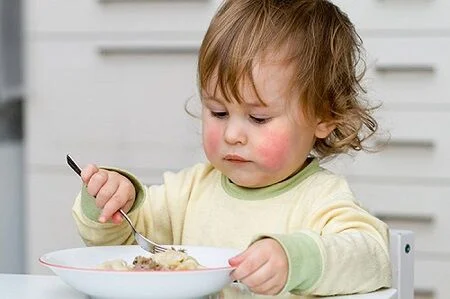One of the feeding problems in babies that occurs when they start eating complementary foods is allergy in babies, which does not happen to all children. It can be more severe in some and milder in others. In this article, you can learn about food allergy symptoms in babies, allergenic foods for babies, food allergy diagnosis and treatment, and other issues like the time to call a doctor for a baby’s allergic reaction.
Food allergy and its symptoms in babies
A food allergy in babies is an overreaction of the immune system to a harmless protein in a particular food. When a child with allergies eats an allergenic food, his body produces antibodies and releases other substances that cause the immune system to react.
If your child has an allergic reaction to something, allergy symptoms can appear within minutes to hours. Sometimes, these symptoms manifest as skin allergies in babies skin and include hives, redness and itching of parts of the skin, eczema or swelling. Also, the child may show gastrointestinal symptoms such as abdominal pain, vomiting or diarrhea.
Most children with mild food allergies have mild reactions, but if a child has a severe allergy, symptoms usually appear immediately. Severe allergies can result in wheezing, swelling of the face, including the tongue and mouth, and difficulty breathing. This severe reaction, which can cause death, is called anaphylaxis.
Food allergies resolve in most children by the age of five, although some allergies, for example to peanuts or seafood, are more likely to persist.
Allergenic foods for babies
Any food can cause allergies, but the most common factors that increase the risk of allergy in babies include:
- Egg
- cow milk
- peanut
- Nuts such as walnuts
- Cereal
- Soy
- Fish such as tuna, salmon and oily fish
- Oysters and scallops, crabs and shrimps
Learn about importance of vitamin D in children’s diet.
Risk factors of food allergy in babies
When a child’s parents or siblings have any type of allergy, such as hay fever, allergic asthma, eczema, or a food allergy, it is more likely that your child will also be allergic to that food. Risk factors for allergies include:
- Having a sibling with a peanut allergy
- Moderate to severe eczema that persists despite following a treatment plan by your doctor
- A history of an immediate allergic reaction to a new food
- Diagnosis of allergy in a baby by a doctor
If your child is at high risk for a food allergy, consult with a doctor or allergist before starting solid foods or introducing new foods, as some children may require extra care and a special diet.
Strategies to reduce the possibility of a baby suffering from food allergies
Most children can start eating solid foods around four to six months old if they show signs of readiness. Every baby is different, so it’s a good idea to talk to your doctor about what foods to give your baby and when to start eating solids. Your doctor may recommend that you start with pureed vegetables, fruits and meat. These foods usually do not cause an allergic reaction in children, but experts recommend that you watch out for allergy symptoms in your child to be sure.
After your child has successfully tolerated a few foods,, you can gradually introduce other allergenic foods. Experts suggest that introducing highly allergenic foods such as nuts, eggs, and fish during the first year of a child’s life may reduce the risk of future allergies.
When adding any new food to your baby’s diet, it is best to wait three to five days before introducing the next new food. Most likely, if there is an allergy, its symptoms will appear during this time. Also, give your child simple foods made from one food so that the cause of the food allergy in babies is known.
Do not give honey or cow’s milk to the child before he is one year old. However, products that contain processed milk protein, such as cheese and yogurt, usually have no problem being included in a child’s diet.
Diagnosis of food allergy in babies
Talk to your doctor if you think your baby may have a food allergy. He or she may order tests, order skin tests, or perform food challenge tests.
During the food challenge test, the doctor administers the suspected food to your child during an office visit and observes for any allergic reactions. This test is the most accurate way to determine a child’s allergy.
Treatment of food allergy in babies
The treatment of food allergy is avoidance of the allergenic substance. If your child has been diagnosed with a food allergy, you need to make sure they don’t eat the allergen and learn as much as you can about it. This includes understanding which foods may contain the allergen, how to interpret food labels, and recognizing early signs of an allergic reaction. Also, make sure that anyone who takes care of your child, such as siblings, relatives, teachers, or baby sitters, knows about your child’s allergies and knows what not to give him.
You should also talk to your child’s doctor about what to do if an allergic reaction occurs. If the child has a mild allergy, the doctor may prescribe antihistamines, and if the child has a severe allergy, the doctor will probably prescribe an epinephrine injection, a medicine that stops anaphylaxis, and you should have this medicine with you at all times.
Time to call a doctor for a baby’s allergic reaction
Parents may be unsure about what to do if their child exhibits signs of an allergic reaction for the first time. If you notice the following symptoms in your child within minutes or hours after eating a new food, you should contact your child’s doctor immediately. He or she can tell you what to do if these symptoms get worse or more severe:
- Skin allergy
- Vomiting or diarrhea
- Wheezing
- Difficulty breathing
- Face Swelling, including the tongue and lips





[…] The only thing you should consider is that after the end of exclusive breastfeeding, before introducing any food, talk to your child’s doctor about your child’s readiness to consume solids, the type of food and the timing of their consumption. Then introduce foods one by one according to the food plan provided to you and wait at least three days after each new food to watch for any allergic reactions. […]
[…] Experts in the past believed that you should not give eggs, fish or products containing peanuts to very young children, because they may cause food allergies in your child. But the latest research has shown that there is no evidence that children will develop allergies from eating these foods early. However, some doctors still recommend to be careful when introducing solid foods to your baby, and if you suspect your baby may be allergic to certain foods, introduce foods one at a time and look for signs of an allergic reaction. […]
[…] your child has already been diagnosed with a milk allergy or shows signs of any type of allergy, such as eczema, do not give him yogurt before consulting a […]
[…] also read this article about Allergy in babies. […]
[…] children may have an allergic reaction to cow’s milk protein, lactose in milk, or gluten in grains. For each of these allergies, […]
[…] Learn about Food allergy and its symptoms in babies. […]
[…] your child is allergic to cow’s milk or if you are a vegetarian, use coconut milk, soy milk, or other vegetable milk […]
[…] Ensure to consult your doctor before introducing bananas and watch out for any signs of allergies. […]
[…] minimize the risk of egg allergies, consider these […]
[…] your baby for any allergic reactions to new foods […]